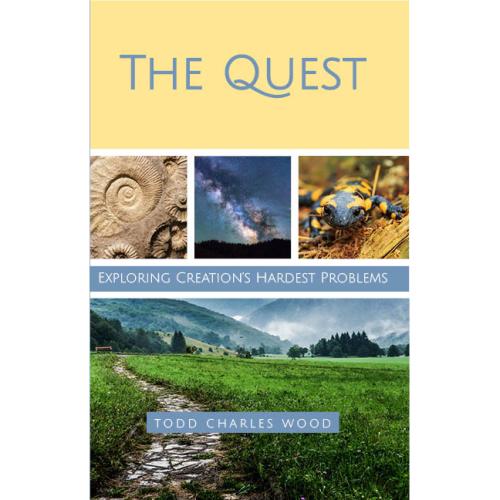The Quest
Todd C. Wood. 2018. PRJ Books. ISBN-13: 978-0999040942

Todd C. Wood. 2018. PRJ Books. ISBN-13: 978-0999040942

In The Quest, the author, Todd Wood, shares some of the lessons he has learned in twenty years of scientific research as a creationist. The author does not attempt to provide a model of creation theory, or to answer common questions about creation. The purpose of the book is to identify the tools needed for a believer to conduct his life and approach his research in a truly Christian manner. Wood is more concerned about attitude than about facts. If you have observed an argument by a person whose position was right but whose demeanor was wrong, you will appreciate this book, and it is recommended reading for anyone wishing to give a Christian witness in the debate over creation and evolution.
The Quest has ten chapters, with a prologue and an epilogue, and consists of 145 pages. Each chapter ends with what might be called an excursus, titled Adoremus – Latin for “let us worship.” These are lessons from nature, giving praise to the Creator. The text is referenced with 69 endnotes, and a short index is included.
The first chapter uses the example of the Spanish explorer, José de Acosta in the late 1500s to make the point that we need not abandon our faith when we face questions we cannot answer. This point is further illustrated in chapter two with the discovery of Australopithecus sediba and how this fossil impacted the research Wood was doing on classification of human-like fossils. The third chapter rounds out the point by explaining that the purpose of his research is not to collect factoids or to win arguments, but to seek to know and understand God better. This is what he means by “the quest” – a journey to know more about God through studying His works.
Chapters 4 and 5 deal with the question of the historicity of Genesis 1-11. Galileo rightly pointed out that God had to accommodate his revelation to our condition, but he overextended the point when he implied the Bible does not teach us anything about the physical world. The historicity of Genesis 1-11 is affirmed by three factors: the narrative structure of the text, the overwhelming testimony of Christians throughout the first 18 centuries of Christian history, and the theology of salvation, which relates death through Adam and life through Jesus Christ.
The next three chapters describe the need to be careful in our use of both science and Scripture. Many poor arguments have been presented that could have been avoided by carefully reading the text of Scripture or by carefully reviewing the evidence from science. Evolutionary theory has survived despite its many flaws, because it explains several different lines of evidence. Creationists need a model that is more successful. Some small successes have been experienced by creationists, but much more is needed to produce a comprehensive model. Creationists also need to be familiar with the common criticisms from others, such as supposed discrepancies between Genesis 1 and Genesis 2. They also need to recognize that difficult questions remain in various disciplines, and there is great need for more research to resolve these issues.
Chapter 9 and 10 describe some attributes needed by creationists in order to give a Christian witness for creation and the gospel. Three necessary personal qualities are faith, humility, and patience. The quest is a journey, not a destination. Jesus gave three rules for Christian living: love God, love your neighbor, and love your enemies. We must practice these virtues if we are to win people to Christ. The kingdom is more than food or drink, and it is about more than the facts of creation. It is about knowing and loving Christ and loving others. This is the real quest, and the reader is invited to join in pursuing it.
Reviewed by Jim Gibson, PhD